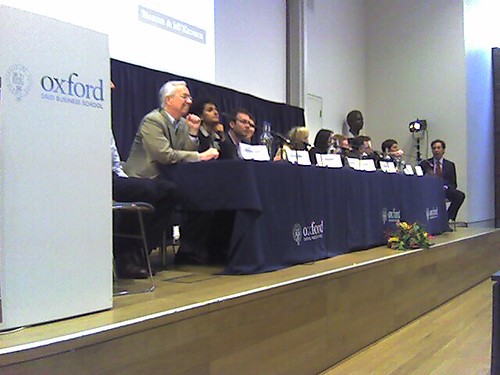Live blogging this:
Lunchtime Panel:
Chris Sacca, Head of Special Initiatives at Google
Reid Hoffman, founder of LinkedIn
Allen Morgan, MD of Mayfield
Alex Welch, founder of Photobucket
Matt Cohler of Facebook
Julie Farris of Scalix
Pete Flint of trulia.
Mike Malone, editor of ABCnews.com’s Silicon Insider
Villy Wang, Executive Director and Co-Founder of BayCat
Ellen Levy is an Network Advisor at Draper Fisher Jurvetson
 Alex Welch, founder of Photobucket: “There is not a big crash coming in social software as there are plenty of niches ready to be filled.”
Alex Welch, founder of Photobucket: “There is not a big crash coming in social software as there are plenty of niches ready to be filled.”
(Comment form the floor: “FaceBook is MySpace for people who know how to read”)
Matt Cohler of Facebook: “If 15 year old says they are going to quit MySpace or us, then I think that’s rare.”
(Show of hands on MySpace – 3 – hands up for Facebook – 50% – SBS students like Facebook).
Reid Hoffman, founder of LinkedIn: “We’re still in a growth phase.” He said the bottom will not drop out of the market.
Chris Sacca, Head of Special Initiatives at Google: “What happened last time was that there was a pervasive bubble in hardware/broadband. Now there is a bubble in the consumer internet, but we haven’t seen one in access of the chip side, so it’s less macro-economic.”
Julie Farris of Scalix: “The open source movement is very disruptive and part for the reason why there has been a collapse of capital needed to start up a company.”
Pete Flint of trulia.com: “Admitedly you still need to have product and marketing people, so you still need that investment.”
Alex Welch, founder of Photobucket:” There’s definitely a lot of pros about being the Valley. Facebook is just down the street from us. Making meetings is easy. There’s still a lot to be said for facet-time.”
Sacca: “We have 11 core offices around the world. I met the team that built Skype and Kazaa in Tallin estonia and was astounded to learn none of them had had formal IT training. As teenagers they took the manuals home from the Police computers and without any Internet access built software.”
Generally there was a lot of talk about the advantages of clusting in Silicon Valley, and how other centres should reproduce clusters.
Is there a future for more locally branded social networking sites?
Hoffman: “I think silo-ing networks in small niches won’t be as valuable as the bigger networks. In general you want them to be as big as possible to be valuable.”
Most interesting business plan in the last month?
One panelist: “I can’t tell you.”
Answers: Not just Web 2.0 – batteries, electronics. Ringtones, Open source. Rapid diagnosis of chemicals. Tesla Motors. Alternative Energy. Emissions reduciton, Solar power. China deals – unlimited potential. Uploading video – indie film distribution.
Julie: OpenStreetmap in the UK is the most interesting project I’ve seen recently.
Twitter.com – SMS messages about what you are doing in the day, and anyone can get those.
Welch : SodaHead.com: a social prediction web site – you predict anything you want and over time you get ratings for your preditctions.
Sacca: “I Like Maraki.com. It’s the Kazaa of access.”
Alan Rusbridger, editor of the Guardian: “Who or what can stop Google taking over the world.”
Flint: “Google can do things for free because of the ad model which others had to charge for, hence it’s scary. At the same time the Net has an effect of increasing fragmentation, so I don’t think they will take everything.”
Sacca: “There are few aspects of our business that can’t be beat, look at YouTube – they spanked us.”
What market would you enter to startup?
“I’d go to Google”
Harris: “I’d start in a larger organisatoin first.”
Flint: “I would look at Silicon Valley – Many US firms won’t bother launching in the UK, so I’d adapt a US model for the UK.”
“Personal healthcare and technology for aging populations. Or mobile.”
“Second Life.”
“Social Entrepreneurship: Alleviate poverty and make money at the same time.”
Welch: “Don’t look at anything mainstream.”
Hoffman: “The consumer Internet is still a great place for business. But you need to find an area that is unique.”
Sacca: “Don’t wait until you graduate. Meet geeks and befriend them. Become one. I like business to take the job in as big a company as you can go where you get to touch every aspect. 30-60 people companies are the best.”